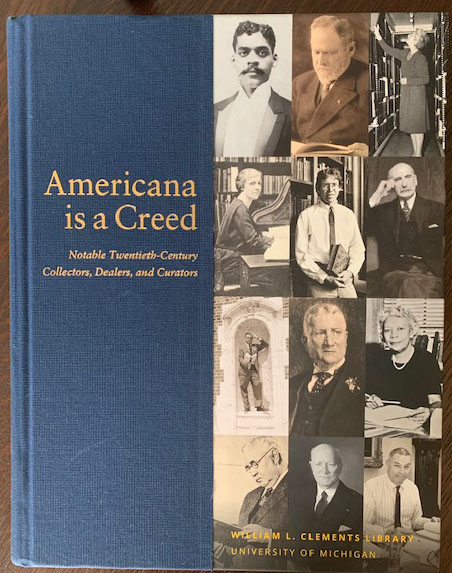Americana is a Creed
- by Bruce E. McKinney

To understand the process understand the players
The Clements Library in Ann Arbor, Michigan, founded in 1923 at the University of Michigan holds collections of print and manuscript materials on the history of North America and the Caribbean, with particular strengths in 18th and 19th century American history. It is an important American institution. They issue books on an irregular basis and I’m lucky to be reading their most recent, Americana is a Creed, a series of excerpts and essays on many of the important librarians, collectors and dealers involved in Americana. It’s the second volume of two, the first – The Pioneer Americanists: Early Collectors, Dealers, and Bibliographers was published in 2017.
The introductory essay to the recent volume is a gem that weaves the complex threads of collecting into a coherent view on the changing times, themes, and personalities. The individual pieces are similarly illuminating.
The following persons have been nominated for canonization:
Edward Everett Ayer 1841-1927
Wymberley Jones De Renne 1853-1916
Wilberforce Eames 1855-1937
William L. Clements 1861-1934
Henry R. Wagner 1862-1957
Charles E. Goodspeed 1867-1950
George D. Smith 1870-1920
Bruce Cotton 1873-1854
Charles P. Everitt 1873-1951
Arthur Alfonso Schomburg
Harold C. Holmes 1877-1965
Edward Alexander Parsons 1878-1962
Wright Howes 1882-1978
Edward E. Eberstadt 1883-1958
Charles F. Heartman 1883-1953
E. Millicent Sowerby 1883-1977
Thomas W. Streeter 1883-1965
Margaret Bingham Stillwell
Ernest Wessen 1887-1974
Douglas C. McMurtrie 1888-1944
Randolph G. Adams 1892-1951
Michael J. Walsh 1894-1984
Dorothy Porter Wesley 1905-1995
David Magee 1905-1977
David A. Randall 1905-1975
Leona Rostenberg 1908-2005
Madeleine Stern 1912-2007
Charles Hamilton 1913-1996
Marcus A. McCorison 1926-2013
Charles L. Blockson 1933-
Michael Zinman 1938-
John H. Jenkins 1940-1989
William S. Reese 1955-2018
It’s logical, if disappointing, to see Bill Reese on this list. He belongs, but his death at an early age, injects reality into a list that could otherwise mostly be statues in a museum. And I’ve written elsewhere of the importance of Wright Howes and Ernest Wessen who bought and sold gems at very reasonable prices.
I can also see places for others who have been omitted. No auction houses? It’s as if this is a book about the biggest waves in a world that has been transformed by storms, none bigger than Sotheby’s and Christies or persistent than Bonhams and Swann’s.
It’s an interesting group for whom the common denominator is involvement. To get on that list you needed to be brilliant, well-connected, generous and in few cases, ruthless. In other words, old books and collectible sundries are simply a particularly beautiful patch on the tapestry of life.
Both volumes are highly recommended. The first is available online through Oak Knoll Books. The second volume will probably be offered soon. And I’ll announce the third volume today, which to make the set complete must tell the stories of the auctions and the contentious battles throughout the 20th century as they shifted from “for the trade” to all with the will, resources and a paddle.